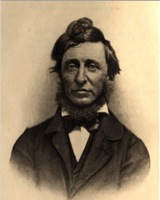Thoreau
Henry David Thoreau (born David Henry Thoreau; July 12, 1817 – May 6, 1862)[1] was an American author, poet, naturalist, tax resister, development critic, surveyor, historian, philosopher, and leading transcendentalist. He is best known for his book Walden, a reflection upon simple living in natural surroundings, and his essay, Civil Disobedience, an argument for individual resistance to civil government in moral opposition to an unjust state.
Thoreau's books, articles, essays, journals, and poetry total over 20 volumes. Among his lasting contributions were his writings on natural history and philosophy, where he anticipated the methods and findings of ecology and environmental history, two sources of modern day environmentalism. His literary style interweaves close natural observation, personal experience, pointed rhetoric, symbolic meanings, and historical lore; while displaying a poetic sensibility, philosophical austerity, and "Yankee" love of practical detail.[2] He was also deeply interested in the idea of survival in the face of hostile elements, historical change, and natural decay; at the same time imploring one to abandon waste and illusion in order to discover life's true essential needs.[2] He was a lifelong abolitionist, delivering lectures that attacked the Fugitive Slave Law while praising the writings of Wendell Phillips and defending abolitionist John Brown. Thoreau’s philosophy of civil disobedience influenced the political thoughts and actions of such later figures as Leo Tolstoy, Mahatma Gandhi, and Martin Luther King, Jr.
Thoreau is sometimes cited as an individualist anarchist.[3] Though Civil Disobedience calls for improving rather than abolishing government – "I ask for, not at once no government, but at once a better government"[4] – the direction of this improvement aims at anarchism: “‘That government is best which governs not at all;’ and when men are prepared for it, that will be the kind of government which they will have.”[4][1]
References
- Biography of Henry David Thoreau, American Poems (2000-2007 Gunnar Bengtsson).
- Henry David Thoreau : A Week on the Concord and Merrimack Rivers / Walden / The Maine Woods / Cape Cod, by Henry David Thoreau, Library of America, ISBN 0940450275
- Encyclopaedia of the Social Sciences, edited by Edwin Robert Anderson Seligman, Alvin Saunders Johnson, 1937, p. 12.
- Thoreau, H. D. Resistance to Civil Government
